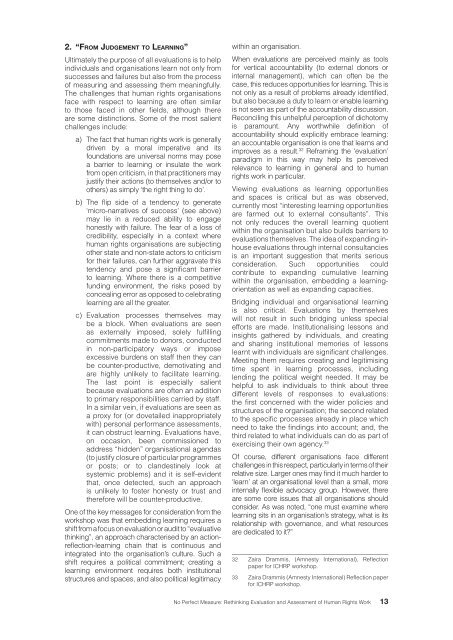No Perfect Measure: Rethinking Evaluation and ... - The ICHRP
No Perfect Measure: Rethinking Evaluation and ... - The ICHRP
No Perfect Measure: Rethinking Evaluation and ... - The ICHRP
Create successful ePaper yourself
Turn your PDF publications into a flip-book with our unique Google optimized e-Paper software.
2. “From Judgement to Learning”<br />
Ultimately the purpose of all evaluations is to help<br />
individuals <strong>and</strong> organisations learn not only from<br />
successes <strong>and</strong> failures but also from the process<br />
of measuring <strong>and</strong> assessing them meaningfully.<br />
<strong>The</strong> challenges that human rights organisations<br />
face with respect to learning are often similar<br />
to those faced in other fields, although there<br />
are some distinctions. Some of the most salient<br />
challenges include:<br />
a) <strong>The</strong> fact that human rights work is generally<br />
driven by a moral imperative <strong>and</strong> its<br />
foundations are universal norms may pose<br />
a barrier to learning or insulate the work<br />
from open criticism, in that practitioners may<br />
justify their actions (to themselves <strong>and</strong>/or to<br />
others) as simply ‘the right thing to do’.<br />
b) <strong>The</strong> flip side of a tendency to generate<br />
‘micro-narratives of success’ (see above)<br />
may lie in a reduced ability to engage<br />
honestly with failure. <strong>The</strong> fear of a loss of<br />
credibility, especially in a context where<br />
human rights organisations are subjecting<br />
other state <strong>and</strong> non-state actors to criticism<br />
for their failures, can further aggravate this<br />
tendency <strong>and</strong> pose a significant barrier<br />
to learning. Where there is a competitive<br />
funding environment, the risks posed by<br />
concealing error as opposed to celebrating<br />
learning are all the greater.<br />
c) <strong>Evaluation</strong> processes themselves may<br />
be a block. When evaluations are seen<br />
as externally imposed, solely fulfilling<br />
commitments made to donors, conducted<br />
in non-participatory ways or impose<br />
excessive burdens on staff then they can<br />
be counter-productive, demotivating <strong>and</strong><br />
are highly unlikely to facilitate learning.<br />
<strong>The</strong> last point is especially salient<br />
because evaluations are often an addition<br />
to primary responsibilities carried by staff.<br />
In a similar vein, if evaluations are seen as<br />
a proxy for (or dovetailed inappropriately<br />
with) personal performance assessments,<br />
it can obstruct learning. <strong>Evaluation</strong>s have,<br />
on occasion, been commissioned to<br />
address “hidden” organisational agendas<br />
(to justify closure of particular programmes<br />
or posts; or to cl<strong>and</strong>estinely look at<br />
systemic problems) <strong>and</strong> it is self-evident<br />
that, once detected, such an approach<br />
is unlikely to foster honesty or trust <strong>and</strong><br />
therefore will be counter-productive.<br />
One of the key messages for consideration from the<br />
workshop was that embedding learning requires a<br />
shift from a focus on evaluation or audit to “evaluative<br />
thinking”, an approach characterised by an actionreflection-learning<br />
chain that is continuous <strong>and</strong><br />
integrated into the organisation’s culture. Such a<br />
shift requires a political commitment; creating a<br />
learning environment requires both institutional<br />
structures <strong>and</strong> spaces, <strong>and</strong> also political legitimacy<br />
within an organisation.<br />
When evaluations are perceived mainly as tools<br />
for vertical accountability (to external donors or<br />
internal management), which can often be the<br />
case, this reduces opportunities for learning. This is<br />
not only as a result of problems already identified,<br />
but also because a duty to learn or enable learning<br />
is not seen as part of the accountability discussion.<br />
Reconciling this unhelpful perception of dichotomy<br />
is paramount. Any worthwhile definition of<br />
accountability should explicitly embrace learning:<br />
an accountable organisation is one that learns <strong>and</strong><br />
improves as a result. 32 Reframing the ‘evaluation’<br />
paradigm in this way may help its perceived<br />
relevance to learning in general <strong>and</strong> to human<br />
rights work in particular.<br />
Viewing evaluations as learning opportunities<br />
<strong>and</strong> spaces is critical but as was observed,<br />
currently most “interesting learning opportunities<br />
are farmed out to external consultants”. This<br />
not only reduces the overall learning quotient<br />
within the organisation but also builds barriers to<br />
evaluations themselves. <strong>The</strong> idea of exp<strong>and</strong>ing inhouse<br />
evaluations through internal consultancies<br />
is an important suggestion that merits serious<br />
consideration. Such opportunities could<br />
contribute to exp<strong>and</strong>ing cumulative learning<br />
within the organisation, embedding a learningorientation<br />
as well as exp<strong>and</strong>ing capacities.<br />
Bridging individual <strong>and</strong> organisational learning<br />
is also critical. <strong>Evaluation</strong>s by themselves<br />
will not result in such bridging unless special<br />
efforts are made. Institutionalising lessons <strong>and</strong><br />
insights gathered by individuals, <strong>and</strong> creating<br />
<strong>and</strong> sharing institutional memories of lessons<br />
learnt with individuals are significant challenges.<br />
Meeting them requires creating <strong>and</strong> legitimising<br />
time spent in learning processes, including<br />
lending the political weight needed. It may be<br />
helpful to ask individuals to think about three<br />
different levels of responses to evaluations:<br />
the first concerned with the wider policies <strong>and</strong><br />
structures of the organisation; the second related<br />
to the specific processes already in place which<br />
need to take the findings into account; <strong>and</strong>, the<br />
third related to what individuals can do as part of<br />
exercising their own agency. 33<br />
Of course, different organisations face different<br />
challenges in this respect, particularly in terms of their<br />
relative size. Larger ones may find it much harder to<br />
‘learn’ at an organisational level than a small, more<br />
internally flexible advocacy group. However, there<br />
are some core issues that all organisations should<br />
consider. As was noted, “one must examine where<br />
learning sits in an organisation’s strategy, what is its<br />
relationship with governance, <strong>and</strong> what resources<br />
are dedicated to it?”<br />
32 Zaira Drammis, (Amnesty International), Reflection<br />
paper for <strong>ICHRP</strong> workshop.<br />
33 Zaira Drammis (Amnesty International) Reflection paper<br />
for <strong>ICHRP</strong> workshop.<br />
<strong>No</strong> <strong>Perfect</strong> <strong>Measure</strong>: <strong>Rethinking</strong> <strong>Evaluation</strong> <strong>and</strong> Assessment of Human Rights Work 13

















